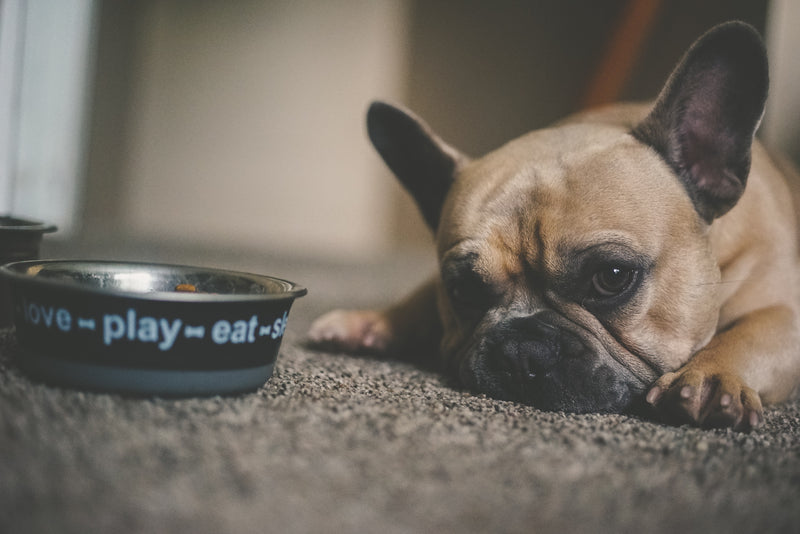Published: February 2021 | Updated: August 2023
Imagine this: one day your trusty, furry friend is happy and healthy, acting normally, but then their behavior begins to change. They become lethargic, show little interest in their food, are vomiting or have diarrhea, and their eyes and gums begin to have a yellowish tint. You have kept a close eye on them and haven’t seen them eat anything out of their normal diet.
What could be happening to your dog?
These characteristics can all be symptoms of aflatoxin poisoning in dogs, and unfortunately can have detrimental consequences..
What are Aflatoxins?
Aflatoxins are a type of mycotoxin, and they are considered the most poisonous. Mycotoxins are toxins that are produced by different strains of mold and may be found in common pet food ingredients.
Under conditions where this mold is able to grow and produce high levels of mycotoxins, they may reach a level of becoming toxic to animals. Aflatoxins specifically are produced by molds generally found in cereal grains, such as corn, wheat, and rice, ingredients that are commonly utilized in dog food.
What Do Mycotoxins Do?
Mycotoxins can cause liver damage. Most commonly, vomiting, diarrhea, lethargy, and jaundice (yellow tint to eyes, gums, and skin) are signs that your dog may have aflatoxin poisoning.
However, damage to the liver may produce no visible symptoms. Unfortunately, mycotoxin poisoning can happen from low levels of exposure over a long period of time, so this damage could be occurring long before you know it is happening. This is why it may seem that the symptoms pop up without any major change to your dog’s diet.
In addition to this liver damage, mycotoxin poisoning can have a negative impact on dog gut health as well. The microbial balance in the gut that is so important for proper digestion and immunity can be destroyed by mycotoxins, which leads to improper absorption of nutrients, decreased overall health, and may also lead to leaky gut syndrome in pets.
What Should I Do if I Suspect My Dog Has Had Exposure to Mycotoxins?
If your dog is showing symptoms of mycotoxin poisoning, you should contact your vet immediately. It is important to be able to tell your vet what you feed your dog, so it may be helpful to take pictures of your dog food bag, the ingredients, and the lot number.
You should also contact your vet immediately if you are suspicious that they may have been exposed to aflatoxins without outward symptoms, as liver damage may still have occurred.
Lastly, if you learn that your pet food product did in fact contain some level of aflatoxins, you should dispose of the feed immediately, and clean and sanitize (with bleach) anything that has come into contact with the feed, then rinse well before using again.
How Do I Prevent Mycotoxins in My Dog?
Mycotoxins are a scary thing. If a dog can be ingesting food that is contaminated well before you see any symptoms, then how are you supposed to prevent them from becoming poisoned in the first place?
The first step is to evaluate your food for safety. The risk of feeding mycotoxins cannot be all-together eliminated, because the potential for feedstuffs to develop the toxins is always present.
However, that doesn’t mean you should avoid those ingredients altogether. A company that uses proper processing techniques, such as filtering, washing, and acid-base mold prevention, can help minimize the presence of mycotoxins in feed.
Additionally, feeds that are supplemented with omega-3 fatty acids, antioxidants, and detoxifying microbes may decrease the risk of mycotoxin exposure. Feeds that contain organic grains may have a higher risk of mycotoxin production.
In addition to a high quality dog food that reduces risk for mycotoxin exposure, gut health plays an important role in combating mycotoxin poisoning.
Saccharomyces boulardii is a probiotic that boasts many benefits for a healthy gut. Some of these include the ability to promote dog immune function within the GI tract, the ability to bind to microbial pathogens which prevents them from invading the gut, and the ability to bind microbial toxins and prevent their toxic effects.
The good news?? All of FullBucket’s Dog Digestion products provide S. boulardii to help boost gut health and immunity in your dog.
Additionally, FullBucket’s Canine ADD Bioclay Plus Paste contains smectite clay, which can support the removal of pathogens and toxins from the canine digestive system in times of emergency.
While the issue of toxins in dog food seems inevitable, you can still feel encouraged! By strengthening your dog’s digestive health and immune system with beneficial bacteria, and carefully keeping an eye on their feed and behavior, you can help minimize the risk of mycotoxin poisoning in your dog.
Read More:
Pet Food Recalled for Potentially Fatal Levels of Aflatoxin
Mycotoxins and the Pet Food Industry
Saccharomyces boulardii: What Makes it Tick as a Successful Probiotic?


